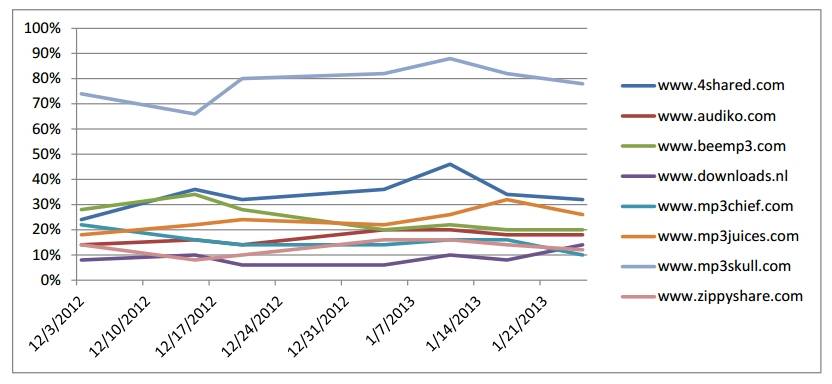This article is more than 1 year old
RIAA: Google failing on anti-piracy push
Six-month report card: FAIL
The Recording Industry Ass. of America has issued a report on Google's progress in cutting the availability of pirate websites in its search results, and the verdict isn't so much "could try harder" as "you are an utter failure," as this hack's Latin teacher once judged him.
"Our initial analysis concludes that so far Google's pledge six months ago to demote pirate sites remains unfulfilled," said Steven Marks, general counsel for the RIAA. "Searches for popular music continue to yield results that emphasize illegal sites at the expense of legitimate services, which are often relegated to later pages. And Google's auto-complete function continues to lead users to many of those same illicit sites."
Last August, Google said that it would skew its search results away from piracy sites by tweaking its algorithm to try to filter them out. But a team of (presumably very bored) RIAA researchers spent several weeks in December checking on the Chocolate Factory's progress – El Reg only hopes their Christmas party made up for it.
Google had made some progress, the RIAA acknowledged, but the search results are still tilted too much towards reporting sites Google itself has identified as being serial offenders in the piracy world. Such sites appeared in 98 per cent of the first page results of Google searches, compared to authorized download sites such as iTunes or Amazon that got on the front page around half the time.
Most of the sites identified are those about which the RIAA itself has sent at least 100,000 notices of infringement to Google. The report cited the efforts of its sister group, the British Phonographic Industry (BPI), which has sent Google notices of more than 350,000 instances of infringement about Zippyshare.com – and yet it still comes up in searches.
The RIAA report expressed particular concern at these first-page search results, since research shows that nine out of 10 readers find what they want on that results page. If you go five pages into a search result, you will always find a link to sites that it has identified as pirate coves, it states.
Autocomplete in the search bar also gets a thumbs-down from the RIAA. The researchers searched for "MP3" or "Download" for the most popular Billboard tracks of the day, and 88 per cent of the time they got results from sites with at least 1,000 copyright notices against them in that crucial first page.
That said, Google gets over four million such notices each month, now that email has made the process virtually costless. The RIAA's post bill would have bankrupted the organization back in the days of dead-tree mail, and caused a lot of postmen to retire early on worker's comp. Such is progress.
"Based on the data described herein, the search rankings for sites for which Google has received large numbers of instances of infringement do not appear to have been demoted by Google's demotion signal in any meaningful way, at least with respect to searches for downloads or mp3s of specific tracks or artists," the report concludes.
The RIAA clearly isn't going to give up on this, and says it will continue the search analysis on Google's results. So we can, no doubt, expect an annual report to brighten up the month this coming August. ®

